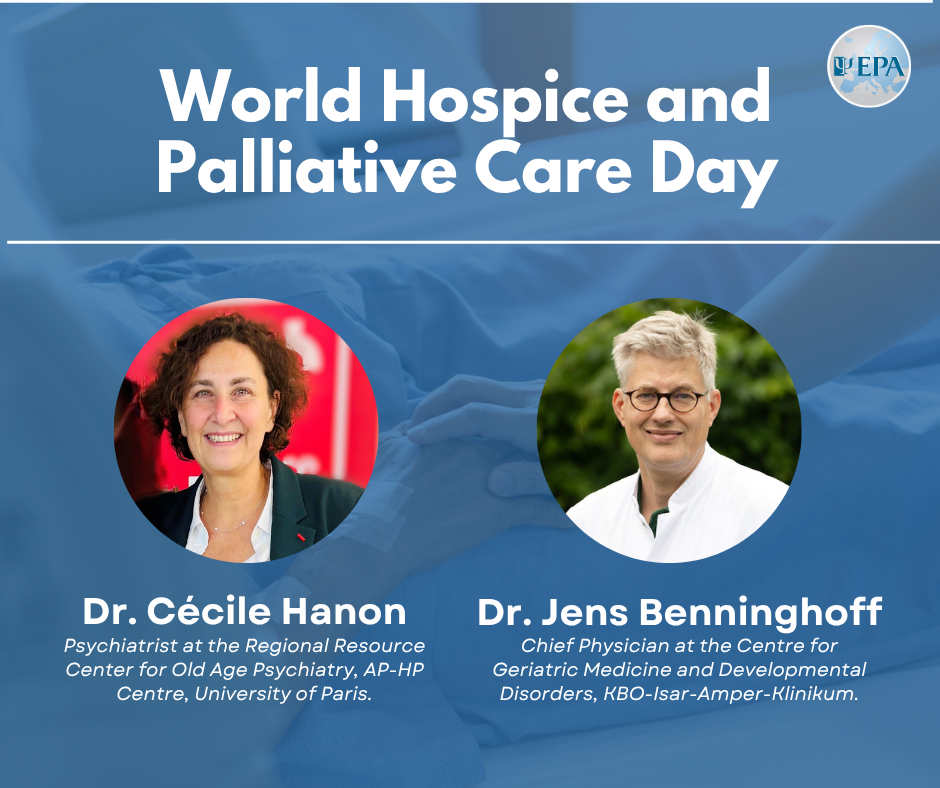World Hospice and Palliative Care Day – An interview with Cécile Hanon and Jens Benninghoff

The World Hospice and Palliative Care Day aims to increase awareness of hospice and palliative care, which are critical services that enhance the quality of life for those with life-limiting conditions. Today’s focus is on the compassionate care offered by hospices and palliative care providers, as well as advocating for global access to these services.
On this occasion, the EPA is pleased to share an interview with Cécile Hanon, EPA Secretary for Education and Councillor of the EPA Old Age Psychiatry Section, and Jens Benninghof, Chair of the EPA Old Age Psychiatry Section.
Dr. Hanon, MD, PhD, is a psychiatrist at the Regional Resource Center for Old Age Psychiatry, AP-HP Centre, University of Paris. She works in the Academic Medical Department of Psychiatry and Addictology at Corentin-Celton Hospital in Issy-les-Moulineaux, France.
PD Dr. Jens Benninghoff is Chief Physician at the Centre for Geriatric Medicine and Developmental Disorders, KBO-Isar-Amper-Klinikum.
- From your perspective, what is the role of psychiatry—particularly old age psychiatry—in supporting patients and families during palliative and end-of-life care?
Old age psychiatry or geriatric psychiatry (GP) is pivotal in supporting patients and their families through the emotional, cognitive, and relational challenges of end-of-life care. In fact, it helps them name and understand complex emotions such as fear, loss, or relief, and promotes open dialogue around suffering and adaptation.
By addressing depression, anxiety, or loss of meaning, psychiatry contributes to maintaining dignity, identity, and continuity of self until the end of life. In addition, geriatric psychiatrists are THE experts in treating delirious elderly patients given the average age for palliative care patients is roughly 75 years in general.
- What are some of the key challenges mental health professionals face when addressing emotional and psychological needs in palliative settings?
Mental health professionals face significant challenges in palliative care, including persistent taboos around death, emotional avoidance among families and staff, and the difficulty of distinguishing normal sadness from pathological distress. Psychiatric expertise is often involved too late, sometimes because of the stigmatized role of psychiatry in general.
Therefore, anti-stigma campaigns should also reach out to this particular set of patients and their peers. Ethical tensions around consent, capacity, and the wish to die require both clinical expertise and ethical concern. Strengthening training and interdisciplinary communication is essential to address these complex needs.
- Looking ahead, how can we strengthen collaboration between psychiatry and palliative care to improve the quality of life for patients and caregivers?
To improve quality of life for patients and caregivers, psychiatry and palliative medicine must develop a shared culture of care. This means early psychiatric involvement in palliative pathways, regular joint case discussions, and interdisciplinary training on mental health and communication.
The goal of such collaborative approaches should be establishing embedded consulation models. Collaborative research and co-designed interventions that integrate the perspectives of patients and caregivers can help overcome the persistent barriers between these two disciplines and ensure a more human-centered approach to care.


